My contribution is minimal but the conversation is lively and filled with quotes from the film.
Wednesday, September 6, 2017
Monday, September 4, 2017
Close Encounters of the Third Kind: 40th Anniversary
In 1977, Star Wars was the big film in the science fiction genre. It dominated the Summer season and took off as a cultural artifact that continues to resonate today. The likelihood that another science fiction film would come on the scene and impress in the same ways seemed remote, but Steven Spielberg was just at the start of his career and the third major motion picture he directed was going to wow us in ways that were very similar to his pal George Lucas' little space opera. "Close Encounters of the Third Kind" is grounded in the everyday reality of audiences at that time. It was not set on a distant planet with space battles, it was taking place in our backyards, in Mexico, India and at a National Monument in Wyoming. The special effects were very different from "Star Wars" but equally compelling. When the Mothership shows up for the climax of the film, it almost makes you forget the space battles around the Death Star.
The film opened in December so it was a Holiday release and it did gangbusters business. It made more than a $100 million with maybe 300 screens during it's opening run. In 1977/78, that was real money. Three years later in a re-release in a "Special Edition" it added another $16 million. This week's run will add a smaller amount to the total but I think it is impressive that a 40 year old film still draws in enough customers to make a mark on the contemporary charts. The reason is simple, it was a great film in 1977 and it is still a great film, 40 years later.
Steven Spielberg is the consummate film director of the last fifty years. He may be rivaled creatively by directors such as Martin Scorsese or the Coen Brothers, but his track record of film success plus creativity is unparalleled. "Close Encounters" is entirely his baby. Although he has contributed to a few other film scripts that he directed, this is a solo credit, his only one. The inventiveness of the story and the odd way that it plays out building suspense as to what is happening to our sad hero is a testament to Spielberg's creativity with story. Of course his directorial choices are outstanding as well. From the start of the movie, when a black screen is accompanied by an otherworldly note, held for a moment but increasing in volume until a crash and then the screen fills with a desert sandstorm image, we are hooked. The mundane but complicated work of air traffic controllers, talking on a radio with the flight crews of airlines, depicted on a black and green screen as a set of numbers, comes across like a tense mystery with just enough humor to make it memorable. Finally in the opening sequence we meet the Neary family, who are like all of us. Their home is average, cluttered, and filled with loud kids and distracted parents. The floor of the boys bedroom may be one of the most accurate pieces of set design ever. At the heart of this story is Roy Neary, played by Richard Dreyfess, his second time in a row playing the Spielberg persona on screen in a Spielberg movie.
What happens to Roy on this night changes everything. His relationship with his wife and kids will be damaged in ways that look beyond repair, but it happens slowly. If Quint was obsessive about the Great White, well he had nothing on Roy Neary and the vague form that he keeps seeing in his food, bed and bathroom. At the start of the film he is a well meaning father who kiddingly threatens one son while trying to help the other one figure out fractions in an interesting way. He wants his kids to share the magic of his own childhood experiences and the recurring theme of Pinocchio is introduced. It is only a few days later that he indifferently trashes the house where they all live in a quest to figure out the symbol in his head. His oldest son is embarrassed and lashes out when Roy can't control his frustration and desperation. His wife, the wonderful Terri Garr, is mildly supportive but is also trying to protect him from himself. As much as there is to celebrate at the end of the film, there is plenty of tragedy to get us there. Roy's actual encounter is brilliantly shown with practical effects in the truck he drives for work and the fantastic conceptualization of the UFOs he chases that first night. Spielberg then allows him to undercut his own experience with a clever second encounter that is not at all what it seems. This is another writers touch that is well realized by the most sympathetic of directors.
There are a few moments that will leave modern audiences a bit bewildered. Roy trying to navigate using folded maps and not GPS is a pretty good example. At a official inquiry, a newsman points out that the absence of photos of UFOs is not proof of their non-existence any more than the absence of pictures of planes or cars crashing denies that those things happen [these days, that kind of film fills the evening news]. There is a great humorous sequence when the investigation team needs to read some map coordinates and instead of going on-line, they have to roll a giant globe from a government office to their workspace. So the technology might be dated but the story hold up well. Can we trust the government to tell us the truth? Do we know all there is to know about space? Are some crazy people maybe not crazy? Roy gets lumped in with a guy who believes in Bigfoot and that's enough to discredit him in a lot of eyes. He does discover an ally in Jillian, who has lost her son Barry to the visitors. Barry's disappearance is one of the sequences in the film that is iconic and it was really frightening. It was a moment that made you think this film could go anywhere and any point.
Melinda Dillon was nominated for an Oscar for her role as the distraught mother who also had the same kinds of obsessions as Roy. When the two of them finally work together as they arrive in Wyoming, you can feel the us versus them bonding between the two characters. Director François Truffaut was cast as the main scientific leader of the UFO team, and he works mostly because of his language barrier. Bob Balaban as the cartographer drafted as Truffaut's interpreter also acts as a surrogate for the audience on the inside of the plot. This dual approach to the story might give away too much but because Jillian and Roy don't connect till late in the film, and Balaban is sometimes unclear on what is happening, the suspense is maintained.
The climax of the movie is correctly remembered for the technical proficiency of the special effects and design teams and the outstanding score by John Williams. Williams has a huge number of Oscar nominations but probably fewer wins than he deserves because he was frequently matched against himself. This was one of those years. While most of the time he probably cancelled his competing nominations out, the classical score for Star Wars was not likely to ever be forgotten. His work in this film however is equally sublime and used in such a creative way in the story that maybe he should have received a co-screenwriting credit with Spielberg. Vilmos Zsigmond won the Academy Award for the cinematography of the film, but there were several other photographic geniuses that made contributions as well including: John Alonzo (Chinatown), William Fraker (Wargames),
László Kovács (Paper Moon), Douglas Slocombe (Raiders of the Lost Ark), Allen Daviau (E.T.), and a half dozen others.
There are many themes that you can pull out of this film and all of them feel like that could be the central focus. In the first part, mystery is at hand, in the second act it is obsession and the third transfers to both paranoia and hope. I always see this as a film that is ultimately about how the world can potentially be brought together by an event of this magnitude, or conversely how it could tear us apart. That dichotomy is the script again by the director himself. There are a hundred little moments that deserve more attention, and I hope that despite the fact that this is the first time I have written about this film, it won't be the last and those moments will have some light shined on them as well.
Addendum:
My friend Eric on the East Coast took his son to see this for the first time, while I was taking my daughter to see it today. Eric is a fine writer and he put together a nice post with a heartfelt message to Mr. Spielberg at the end. You might want to look at it here.
Saturday, September 2, 2017
Harrison Ford Draft on the Lambcast Podcast
I was a last minute substitute on this podcast and lucked into the first pick.
I wonder what I should choose.
Take some time and go vote for my slate of Harrison Ford Films HERE.
Saturday, August 26, 2017
The Hitman's Bodyguard (NSFW Trailer listed)
Normally on this site we try to keep it at a PG-13 for the readers. If it is something I am writing, than I want it to be in my voice and I use vulgar language in a fairly narrow spectrum of circumstances. The trailer above however is an accurate reflection of the vulgarity and coarseness of the interactions in the film we are talking about here, so if you can't guess how the maestro of the "MF" word does in this film, the clip will give you plenty to chew on. Reynold's character actually suggests that Jackson is single-highhandedly ruining the word.
This kind of movie is mostly bulletproof. It is not critic friendly, it will be obvious as to what is going to happen, and it will offend a few people both intentionally and unintentionally. It will also entertain you for a couple of hours while you enjoy a refreshing beverage and some popcorn in a cool theater on a hot day. I prefer my popcorn with a good amount of butter flavoring and then I dump in a box of Hot Tamales to sweeten things up. The popcorn taste, mixed with the sweet but spicy candy is solid, but as the candy gets coated with the butterflavoring it adds an extra texture to the treat. If you are dieting, you should not go to see this film, because it demands that you consume things that are not good for you but taste delicious.
 |
| Mosaic electronic poster at Hollywood Achlight |
Ryan Reynolds has become a very successful film star, although his most successful film is also one of his most recent. "Deadpool" has a few things in common with this movie, an irreverent sense of humor and a willingness to go for big action, but otherwise they are very different films. Samuel L. Jackson could make this movie in his sleep. He simply brings his usual bravado and colorful vocabulary and supplements it with the kind of gleeful violence we used to get from "Tom and Jerry" cartoons. The premise is simple, a professional bodyguard ends up trying to protect a contract killer that has crossed his path before. This is a bickering buddy film, each character has quirks that make them appealing and repulsive, and we spend a lot of time with the two of them togeteher matching insults.
If there is a pretender to the crown of "Most Colorful Cursing in the Movies", it might be the character played by Selma Hayek in this film, plus she does it bi-bilingually. If you ever feel a bit overwhelmed by the language, let me suggest some Junior Mints to go along with the popcorn. A refreshing mint might take the edge off of the palate enough that you can tolerate a few more curse words, in at least two languages.
Now leaving the snack bar menu for a bit and talking about the movie, I will say there are a couple of things that were nice about the film. The locations for the last act are in Amsterdam and take advantage of the city's quaint architecture and street layouts. There may have been an Alister MacLean film that used the canals of Amsterdam for a chase, I have a vague childhood memory, but it was certainly not as elaborate a chase scene as we get here. The integration of boats, cars and motorcycles made for a terrific sequence. The main problem is that there are at least two more car chase scenes after this and neither is as exciting. Gary Oldman is in this thing collecting a paycheck and playing another evil villain. His part is so underwritten that when he gets to the big moral equivocation his character launches into, we are already laughing before Samuel Jackson does.
 Mostly, I'm just filling space here. There are some moral qualms you can have about using genocide as a plot point in a comedy, and the use of vehicles as terror weapons may be offensive as well. This movie is too silly to take seriously. Go get a refill on your Dr. Pepper or other beverage of choice. Don't worry about missing anything while you are gone, they will still be cracking wise and shooting crap up when you get back. As a matter of fact, you might want to go to the bathroom as well.
Mostly, I'm just filling space here. There are some moral qualms you can have about using genocide as a plot point in a comedy, and the use of vehicles as terror weapons may be offensive as well. This movie is too silly to take seriously. Go get a refill on your Dr. Pepper or other beverage of choice. Don't worry about missing anything while you are gone, they will still be cracking wise and shooting crap up when you get back. As a matter of fact, you might want to go to the bathroom as well.
Labels:
#hitmansbodyguard,
Action,
Ryan Reynolds,
Samuel L. Jackson,
selma hayek
Tuesday, August 22, 2017
The Commitments

Since I have been under the weather this last week, fresh material is unavailable. I will continue to upload the lost posts from Fogs Movie Reviews, this originally was published in the Fall of 2013.
To a large degree this could properly go into the category, "Movies That I Want Everyone to Hear", because much of the joy in this film derives from the fantastic soundtrack and fresh delivery of the titular band that is the focus of this movie. All the way back to the 1930s, kids were getting together musical acts and putting on a show as the plot of a movie. "The Commitments "shares a lot in common with Mickey and Judy, as long as you ignore the sex, poverty, drug use and the 145 times in 113 minutes that the F-bomb gets dropped.
The premise is incredibly simple. Jimmy Rabbitte is a small time hustler living in the poverty stricken sections of Dublin. He gets by selling pirated videotapes and music out of his bag wherever he can find a receptive audience. His dream however is to manage a big time music act. With a core of friends that he poaches from a wedding band that he helps get gigs for, they begin to search for other like minded musicians. The plot follows a simple trajectory. The band comes together, it finds it's musical heart, it is tested by internal conflicts, and it largely succeeds artistically, for a short period of time until the inevitable personality clashes take their toll. There is not a great deal that is new here, or was new even in 1991.
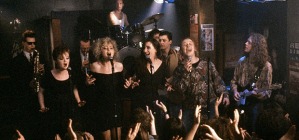 What
is new is the perspective of the band members and the music they want to
make. Jimmy dreams of a soul band, modeled after the likes of Wilson
Pickett or James Brown. It is the rejection of most of the contemporary
music of it's time that provides several bits of humor. Girls who
audition for the band in their Madonna styles get hustled off as soon as
Jimmy gets a good laugh. Heavy Metal musicians are considered but
rejected because their style is
so at odds with the image Jimmy has. Punks and Boy George wanna be's
get the door slammed in their faces. This is a musical film, set in the
period of U2, Sinead O'Conner, Guns and Roses that rejects all of those
musical styles. This band is going to ape the soul classics of the early
sixties, not the punk aesthetic of it's time. An early sequence in the
film has all kinds of musicians showing up at the Rabbitte house, and
Jimmy's Dad is mostly bewildered by what he sees. Jimmy's Dad is an
Elvis man, and he finds much of what passes for music blasphemous, just
as Jimmy does but for different reasons.
What
is new is the perspective of the band members and the music they want to
make. Jimmy dreams of a soul band, modeled after the likes of Wilson
Pickett or James Brown. It is the rejection of most of the contemporary
music of it's time that provides several bits of humor. Girls who
audition for the band in their Madonna styles get hustled off as soon as
Jimmy gets a good laugh. Heavy Metal musicians are considered but
rejected because their style is
so at odds with the image Jimmy has. Punks and Boy George wanna be's
get the door slammed in their faces. This is a musical film, set in the
period of U2, Sinead O'Conner, Guns and Roses that rejects all of those
musical styles. This band is going to ape the soul classics of the early
sixties, not the punk aesthetic of it's time. An early sequence in the
film has all kinds of musicians showing up at the Rabbitte house, and
Jimmy's Dad is mostly bewildered by what he sees. Jimmy's Dad is an
Elvis man, and he finds much of what passes for music blasphemous, just
as Jimmy does but for different reasons.At times some of the characters are a little hard to take. Some of them have pretensions about their music skills, some become megalomaniacs when they discover some hidden talents, and almost all of them are young. Young in the way that the heart can be pulled apart or the ego can blind us to our best interests. However, for every cliche of emotional upheaval or youthful intransigence, there is a music sequence that bounces along and sweeps us up with enthusiasm. When the three girls recruited to sing backup are practicing amidst the laundry hung out to dry, it is a moment of musical and visual heaven.
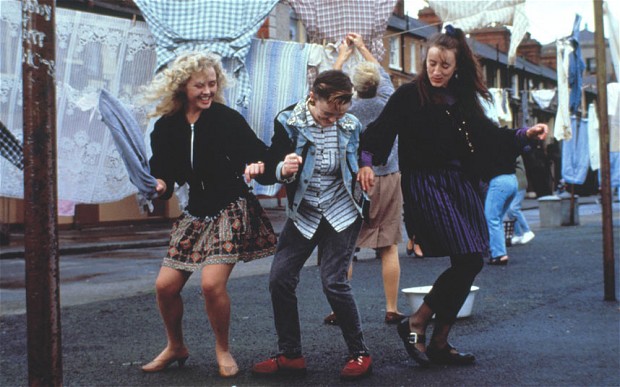 The
band members begin to steep themselves in the soulful music of their
inspirations while Jimmy scrounges up gear and rehearsal space. When
rehearsals start the kids are not quite in sync but they are willing to
keep working. The oldest member of the band Joey "The Lips" Fagan , a
supposedly professional side man who played on records that everyone
would know, begins to mentor some of the band. He provides some
inspiration but also is the catalyst of some of the personal problems
the band faces. All of the characters get a moment or two to connect
with the audience.
The
band members begin to steep themselves in the soulful music of their
inspirations while Jimmy scrounges up gear and rehearsal space. When
rehearsals start the kids are not quite in sync but they are willing to
keep working. The oldest member of the band Joey "The Lips" Fagan , a
supposedly professional side man who played on records that everyone
would know, begins to mentor some of the band. He provides some
inspiration but also is the catalyst of some of the personal problems
the band faces. All of the characters get a moment or two to connect
with the audience.Although the surroundings are grim, the story isn't. Half the band is on the dole, some work to support their families, all of them live in cramped quarters and struggle for a little privacy at times and a bit of the spot light at other times. Every rehearsal gives one of our characters a chance to step up and show something. When the time comes to get on stage, the idea of a band, one that merges diverse parts and components is well illustrated. What is also noticeable is when the band isn't fitting together. There is always the music to carry us through. When the singing starts it is infectious, even when things are not going well.
Jimmy and his family are the string that holds the story together. The book that the movie was based on follows the Rabbitte family and there were two more books turned into movies that shared the same family. Jimmy does not appear in the other films but his Dad does. The Dad is played by the very recognizable character actor Colm Meaney. His early skepticism and then his gradual acknowledgement of the quality of the music is a subtle way of putting something more into the story. It is not dwelt over but occurs in a brief moment during a concert performance.

Watching the band come together and seeing the way they begin to feel about themselves reminds us of the power of music. Jimmy has imaginary interviews with the music press as he soaks in the tub or lays in bed. Joey may or not be what he claims but he certainly lives like he is. Some of the band make sacrifices and others are unwilling to. The usual strains begin to surface but the girls are singing well, the lead singer has a great soulful voice and the instrumentals are constantly getting tighter. The question becomes whether the band will reach it's potential before everything implodes.
 Most of the young folks in the band were actually musical performers
before they got involved in acting. Glen Hansard who plays guitarist
Outspan Foster goes on to star in the movie "Once" for which he wrote
the Academy Award winning song "Falling Slowly". You can see when the
musical sequences are playing that they feel involved and Committed. The
story has bits of humor and character development but it really isn't
about the plot.
Most of the young folks in the band were actually musical performers
before they got involved in acting. Glen Hansard who plays guitarist
Outspan Foster goes on to star in the movie "Once" for which he wrote
the Academy Award winning song "Falling Slowly". You can see when the
musical sequences are playing that they feel involved and Committed. The
story has bits of humor and character development but it really isn't
about the plot.A long concert sequence is the climax of the movie. The band and the audience are in sync when they are on stage and Jimmy appears to be on the brink of getting the band a professional music contract. Backstage things are not solid. The band members have rivalries and jealousies that tear at them. This particular night they were supposed to jam with Wilson Picket himself. It was all arranged, at least according to Joey. When The night is ending and Picket has not shown up, all hell breaks loose. There is one final climatic singing sequence and then the story plays out as it inevitably would.
The director of this film was Alan Parker. He made films like "Mississippi Burning", "Midnight Express", and "Angel Heart". What I think is surprising is that he also made musicals. "Fame", "Pink Floyd's The Wall", "Bugsy Malone" and "Evita" are on his resume. This was a modestly successful import film for the American market. The Irish accents almost qualify it as a foreign language film (much like "Snatch" or "Lock, Stock and Two Smoking Barrels"). In the U.K however it was the most honored film of that year, receiving the BAFTA Awards for best editing, screenplay, director and film. It may be the setting that kept it from being a bigger hit or as well remembered as it deserves to be. Anyone who loves good soul music however will take this film to heart and if you like the story of the kids putting on a show, this updates it and makes it feel real.
Joey: Look, I know you're hurtin' now, but in time you'll realize what you've achieved.
Jimmy Rabbitte: I've achieved nothing!
Joey: You're missin' the point. The success of the band was irrelevant - you raised their expectations of life, you lifted their horizons. Sure we could have been famous and made albums and stuff, but that would have been predictable. This way it's poetry.

Richard Kirkham is a lifelong movie enthusiast from Southern California. While embracing all genres of film making, he is especially moved to write about and share his memories of movies from his formative years, the glorious 1970s. His personal blog, featuring current film reviews as well as his Summers of the 1970s movie project, can be found at Kirkham A Movie A Day.
Friday, August 18, 2017
Logan Lucky
So Steven Soderbergh has returned from his self imposed retirement to add another heist film to his resume. Having already directed the three "Ocean's" film, why he felt compelled to make another in this genre is not really clear, but we can be thankful that he made that choice, "Logan Lucky" is a cleverly structured film with a lot of humor but it is indeed a straight heist movie and not a parody. It is loaded with surprise complication, twists in the plot and enough offbeat characters for two other movies as well.
Channing Tatum and Adam driver are brothers Jimmy and Clyde Logan. They are a couple of sad sacks that have a reputation in their family for failure. Jimmy was on his way to the NFL when he blew out his knee and Clyde lost a hand in Iraq serving his country. They have some small time juvenile crime behind them, but when Jimmy unjustly gets fired from his job, he begins planning a robbery. Heist films usually develop in one of two ways, either we see all the planning and then watch the execution (usually go wrong) or we get a minimal amount of information on the plan and we see it play out in front of us, (usually with lots of surprises). This film falls into the later category. Most of what we see of Jimmy's plan is a list of stupid things not to do during the crime. Everything else is fresh to the audience.
Because the brothers are forced to use some help that is not exactly hitting on all cylinders, you might get the idea that they are not to bright and this is going to go in the direction of a Cohen Brothers movie, where we follow the idiots trying to make their plan work. While there is humor and some of it is based on a shortage of IQ, the main thrust of the movie is about how well planned the robbery actually is. Of course there are detours and complications, but those are the things that add to the value and entertainment of the film.
 Daniel Craig steals most of the scenes he appears in. His bleached hair and motley collection of tattoos place him in a stereotype of hillbilly criminals, but it turns out he understands chemistry pretty well. One of the big laughs in the film comes when he basically conducts a lecture on explosives in the middle of the heist. If you like prison break films, this movie has a plot line that includes some clever misdirection and it gives Dwight Yoakam a chance to shine as an officious Prison warden. There are a half dozen other characters that probably deserve to be mentioned, including the cute as a button Farrah MacKenzie who plays Jimmy's daughter Sadie. Riley Keogh is the bother's little sister and she plays a pretty big role in the heist as well.
Daniel Craig steals most of the scenes he appears in. His bleached hair and motley collection of tattoos place him in a stereotype of hillbilly criminals, but it turns out he understands chemistry pretty well. One of the big laughs in the film comes when he basically conducts a lecture on explosives in the middle of the heist. If you like prison break films, this movie has a plot line that includes some clever misdirection and it gives Dwight Yoakam a chance to shine as an officious Prison warden. There are a half dozen other characters that probably deserve to be mentioned, including the cute as a button Farrah MacKenzie who plays Jimmy's daughter Sadie. Riley Keogh is the bother's little sister and she plays a pretty big role in the heist as well.We are getting to the end of summer and that usually means that the films coming out are just trying to make some bucks off of the lack of competition. "Logan Lucky" does not have anything to apologize for, it is well put together and entertaining. You will care about the characters and you hope it all goes well, but what fun would there be if everything goes off like clockwork?
Sunday, August 13, 2017
The Rocketeer

Review By Richard Kirkham
[ This essay was originally Published on the deleted site "Fogs Movie Reviews" in the Fall of 2013]
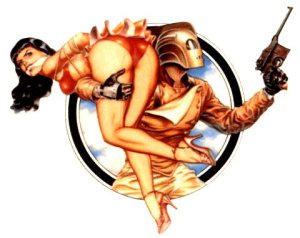 Hollywood
in the Golden Age, Nazi Commandos, Gangsters, Young Love, Air Speed
Races, Howard Hughes, is there anything that is not found in this Walt
Disney Picture from more than twenty years ago? I can't think of
anything they could have added to make this movie better. The story is a
clever adventure which mixes real world events with science fiction
elements and puts it in the backdrop of one of the most romantic times
and places in film history. "The Rocketeer" was a modest success and not
a break out hit that would justify a sequel. The movie harkens back to
the serial adventures of the 1940s but is based on a racy 1982 graphic
novel/comic, which has enjoyed greater literary success than it's
cinematic cousin. There are some obvious changes made in adapting this
to the big screen. The biggest change was altering the character of
Jenny Blake. Instead of the somewhat seedy "party girl/stripper" she is
in the comic, she becomes a more wholesome ingenue. She is an innocent
young actress, trying to break into the movies by playing in the crowd
scenes in the movies being manufactured at the Hollywood Dream Factories
of the Golden Age.
Hollywood
in the Golden Age, Nazi Commandos, Gangsters, Young Love, Air Speed
Races, Howard Hughes, is there anything that is not found in this Walt
Disney Picture from more than twenty years ago? I can't think of
anything they could have added to make this movie better. The story is a
clever adventure which mixes real world events with science fiction
elements and puts it in the backdrop of one of the most romantic times
and places in film history. "The Rocketeer" was a modest success and not
a break out hit that would justify a sequel. The movie harkens back to
the serial adventures of the 1940s but is based on a racy 1982 graphic
novel/comic, which has enjoyed greater literary success than it's
cinematic cousin. There are some obvious changes made in adapting this
to the big screen. The biggest change was altering the character of
Jenny Blake. Instead of the somewhat seedy "party girl/stripper" she is
in the comic, she becomes a more wholesome ingenue. She is an innocent
young actress, trying to break into the movies by playing in the crowd
scenes in the movies being manufactured at the Hollywood Dream Factories
of the Golden Age.
 Jenny's
boyfriend is Cliff Secord, a barnstorming pilot trying to get his new
plane ready for the national air races. Southern California was in a
growth spurt when it comes to aviation. By 1939 more than half the
planes in the country were made in the state. Aviation was a glamorous
venture, which made heroes of Charles Lindbergh, Amelia Earhart and
Howard Hughes. The Smithsonian Air and Space Museum has an extensive
collection of the "buzz bomb" type planes used by the racers of the
time.
This was the golden age of aviation and it crosses paths in our story
with the golden age of Hollywood. Cliff and his mechanic mentor Peevy
discover a rocket pack, hidden in their old bi-plane by gangsters trying
to escape from the FBI. The crooks substitute an old vacuum cleaner for
the rocket and when their car explodes, destroying Cliff's racing
plane, the feds believe the rocket was destroyed as well. So Cliff and
Peevy look to the Rocket as a way of making back some money to restore
their dreams of racing in the Nationals.
It turns out that the gangsters are seeking the rocket pack for a
Hollywood star. In 1980, celebrity biographer Charles Higham published a
book that claimed that Errol Flynn, the swashbuckling star of "the
Adventures of Robin Hood" was a Nazi spy. The book was widely criticized
by scholars and reviewers for the slipshod reasoning that Higham used
to reach his conclusions. In fact, Flynn's family sued, but since Flynn
had died in 1959, the courts tossed the case on the legal premise that
the dead can't be libeled. Flash forward ten years and the slander is
now being used in a slightly disguised manner. The film Jenny is working
on stars Neville Sinclair, a character clearly based on Errol Flynn.
The confluence of events and setting creates a truly entertaining story,
that anyone who loves movies should appreciate.
Jenny's
boyfriend is Cliff Secord, a barnstorming pilot trying to get his new
plane ready for the national air races. Southern California was in a
growth spurt when it comes to aviation. By 1939 more than half the
planes in the country were made in the state. Aviation was a glamorous
venture, which made heroes of Charles Lindbergh, Amelia Earhart and
Howard Hughes. The Smithsonian Air and Space Museum has an extensive
collection of the "buzz bomb" type planes used by the racers of the
time.
This was the golden age of aviation and it crosses paths in our story
with the golden age of Hollywood. Cliff and his mechanic mentor Peevy
discover a rocket pack, hidden in their old bi-plane by gangsters trying
to escape from the FBI. The crooks substitute an old vacuum cleaner for
the rocket and when their car explodes, destroying Cliff's racing
plane, the feds believe the rocket was destroyed as well. So Cliff and
Peevy look to the Rocket as a way of making back some money to restore
their dreams of racing in the Nationals.
It turns out that the gangsters are seeking the rocket pack for a
Hollywood star. In 1980, celebrity biographer Charles Higham published a
book that claimed that Errol Flynn, the swashbuckling star of "the
Adventures of Robin Hood" was a Nazi spy. The book was widely criticized
by scholars and reviewers for the slipshod reasoning that Higham used
to reach his conclusions. In fact, Flynn's family sued, but since Flynn
had died in 1959, the courts tossed the case on the legal premise that
the dead can't be libeled. Flash forward ten years and the slander is
now being used in a slightly disguised manner. The film Jenny is working
on stars Neville Sinclair, a character clearly based on Errol Flynn.
The confluence of events and setting creates a truly entertaining story,
that anyone who loves movies should appreciate.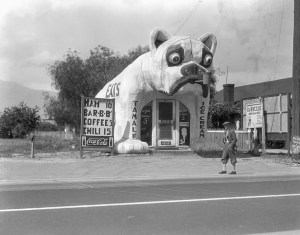 The look of the
film is outstanding. The airfield out in the valley is stocked with old
bi-wings and hopped up racing planes. The wooden bleachers used at the
airshow and the hanger where many early events take place give a genuine
feel for the aviation industry of the period. Not too far from the
airfield is a diner that caters to the pilots and mechanics. It is
modeled after a real food joint here in Los Angeles at the time.
The interior is a lot more spacious than the exterior would allow, so a
little movie magic has to be forgiven. One of the nice touches in the
set is the wall near the telephone where at one point the bad guys
discover the phone number for Jenny, the girl they are at that point
trying to track down.
The look of the
film is outstanding. The airfield out in the valley is stocked with old
bi-wings and hopped up racing planes. The wooden bleachers used at the
airshow and the hanger where many early events take place give a genuine
feel for the aviation industry of the period. Not too far from the
airfield is a diner that caters to the pilots and mechanics. It is
modeled after a real food joint here in Los Angeles at the time.
The interior is a lot more spacious than the exterior would allow, so a
little movie magic has to be forgiven. One of the nice touches in the
set is the wall near the telephone where at one point the bad guys
discover the phone number for Jenny, the girl they are at that point
trying to track down. 
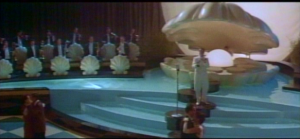 There are dozens of little touches like this that make the film feel
incredibly authentic. In the Hollywood sequences, there is a large set
for "The South Seas Club", an upscale nightclub and restaurant, run by
Eddie Valentine, the mobster being employed by Sinclair to obtain the
rocket. The Front of the club is clearly on a backlot street but the
interior looks luxurious and ethereal. The big band singer makes her
appearance rising out of a giant clam shell. The tables, booths and
dance floors remind us of a hundred art deco sets from 1930s era films.
Only here the lighting is colored in dramatic flourishes of green and
blue.
When Neville leaves Jenny at their table to go and speak to Eddie in
his office, you can see a mermaid swimming in a large fish tank behind
him. As Cliff sneaks into the club, he hides in the laundry room,
labeled with a nice deco font on the sign. Everywhere, there is
attention to the kinds of details that might be ignored in a lesser
production.
There are dozens of little touches like this that make the film feel
incredibly authentic. In the Hollywood sequences, there is a large set
for "The South Seas Club", an upscale nightclub and restaurant, run by
Eddie Valentine, the mobster being employed by Sinclair to obtain the
rocket. The Front of the club is clearly on a backlot street but the
interior looks luxurious and ethereal. The big band singer makes her
appearance rising out of a giant clam shell. The tables, booths and
dance floors remind us of a hundred art deco sets from 1930s era films.
Only here the lighting is colored in dramatic flourishes of green and
blue.
When Neville leaves Jenny at their table to go and speak to Eddie in
his office, you can see a mermaid swimming in a large fish tank behind
him. As Cliff sneaks into the club, he hides in the laundry room,
labeled with a nice deco font on the sign. Everywhere, there is
attention to the kinds of details that might be ignored in a lesser
production.Howard Hughes and the FBI ultimately track down Cliff, and reveal to him the importance of the rocket pack. There is a brilliant one minute propaganda piece done in simple animation that conveys the breadth of the danger that "The Rocketeer" must prevent.
Suddenly, the story takes on broader implications and you can see why Cliff has to try to save Jenny, because otherwise she could be sacrificed in the interests of a bigger world. The Hughes scenes are some of the best in the film because they feature the actor Terry O'Quinn who has been making everything he appears in better for the last thirty three years. The famous "Spruce Goose" plane that had been part of a wartime project mired in controversy, makes an advance appearance here in model form. There is a fun little escape bit that features the plane and O'Quinn has a line that foretells some of the later controversy. Since I have mentioned one of the supporting players, it would be a little unfair to ignore the other actors that help bring this piece of romantic pulp to life. Alan Arkin was playing old way back in 1991, his character Peevy is the wizened mentor to our hero. His line delivery and general demeanor are solid as always but he adds a twinkle in the eye whenever the aviation mechanics get discussed, making his character a lot more interesting than he would otherwise have been. John Polito, a ubiquitous presence on TV and in movies plays Bigelow, the smarmy manager of the airfield and show that Cliff moonlights for. The sight gag concerning his character's resolution is funny but a bit disturbing. An actor I have always appreciated, despite the fact that he never had a role that allowed him to be front and center is Ed Lauter. He plays FBI agent Fitch with a sneer that he could trademark. When the tommy guns come out on a couple of occasions, you can see the glee in his eye as the tough guy gets to do what he does best.
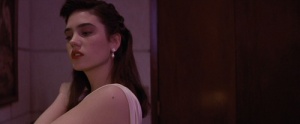 The three
leads of the picture are cast perfectly. The luminous Jennifer Connelly
is Jenny Blake, and she sparkles as the damsel in distress. She is a
love interest that would clearly make both men stop and take notice. Her
character is also a lot more engaged in the plot than simply being the
object of rescue. She links the characters together and her soft line
delivery keeps the character from becoming shrill like others in similar
roles have become. The scenes where she engages in a uncertain
seduction sequence with Neville Sinclar after being drugged by him are
incredibly sexy without being vulgar.
The switch in character might be off putting to fans of the comics, but
it made the love angle much more effective in the movie. While we might
have enjoyed seeing her as a Bettie Page stand in, her character is
more interesting with the change and it helps broaden the appeal of the
movie. Billy Campbell was a stalwart hero type, with an eager manner and
a handsome face. He brought a certain naivete to the part of Cliff
Secord. The pilot is so caught up in the aviation issues that he doesn't
always see how important his girl is to him. When he sees the
propaganda film, it is like he awakens from a being a frivolous
adventurer to becoming a hero. He had of course done heroic things
earlier in the movie, but usually without much thought. His decision to
escape the FBI and go after the Nazi spy ring himself is based in part
on Jenny but also on the seriousness of the threat. When he evaded the
gangsters at the South Seas Club, it is almost comic..
The three
leads of the picture are cast perfectly. The luminous Jennifer Connelly
is Jenny Blake, and she sparkles as the damsel in distress. She is a
love interest that would clearly make both men stop and take notice. Her
character is also a lot more engaged in the plot than simply being the
object of rescue. She links the characters together and her soft line
delivery keeps the character from becoming shrill like others in similar
roles have become. The scenes where she engages in a uncertain
seduction sequence with Neville Sinclar after being drugged by him are
incredibly sexy without being vulgar.
The switch in character might be off putting to fans of the comics, but
it made the love angle much more effective in the movie. While we might
have enjoyed seeing her as a Bettie Page stand in, her character is
more interesting with the change and it helps broaden the appeal of the
movie. Billy Campbell was a stalwart hero type, with an eager manner and
a handsome face. He brought a certain naivete to the part of Cliff
Secord. The pilot is so caught up in the aviation issues that he doesn't
always see how important his girl is to him. When he sees the
propaganda film, it is like he awakens from a being a frivolous
adventurer to becoming a hero. He had of course done heroic things
earlier in the movie, but usually without much thought. His decision to
escape the FBI and go after the Nazi spy ring himself is based in part
on Jenny but also on the seriousness of the threat. When he evaded the
gangsters at the South Seas Club, it is almost comic..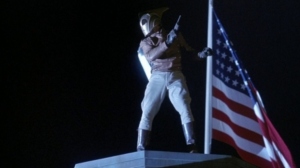 When he escapes the clutches of the Nazi's, he grabs a gun, something
he had not done before. The shot of him on top of the Griffith
Observatory, with the flag waving behind him as he launched toward the
airship, is the moment he is branded "HEROIC".
When he escapes the clutches of the Nazi's, he grabs a gun, something
he had not done before. The shot of him on top of the Griffith
Observatory, with the flag waving behind him as he launched toward the
airship, is the moment he is branded "HEROIC".The final piece of the puzzle is the great Timothy Dalton. Denied an opportunity to continue as James Bond, this was his next major project and it is a solid indicator of the quality actor that the Bond franchise lost. Dalton plays Sinclair as hero, villain, clown and threat. He is oily smoothness when he tries to seduce Jenny in an attempt to locate the rocket. He plays the "star" on the movie set, both as a real actor and as a Prima donna. When he banters with Paul Sorvino playing gangster Eddie Valentine, you can detect the disdain this big movie star, secret agent feels for having to consort with hoods. When he responds to Jenny's accusation near the end of the film that "everything about you is a lie", you can hear the ego come out in his retort "It wasn't lies Jenny, it was acting."
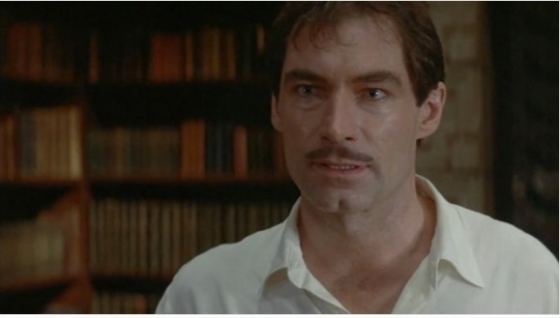
"The Rocketeer" is rousing piece of nostalgia. It combines Hollywood and aviation at the height of their romantic periods and presents us with a credible love story to boot. The mixture of real characters with fictional representations of real characters and finally fictional characters, works to build a fun and exciting adventure story. Even if you can't get behind the story however, there is amazing production design that will evoke the era in a thousand ways. The director Joe Johnson revisits this territory in the recent Marvel Super Hero flick, Captain America: The First Avenger. Johnson has the right touch for this time period. The nightclub sequences and the stunt show all reflect careful planning. Just as an illustration of the love Johnson seems to have for the period, listen to the big band singer. She performs for a longer period than needed to set the tone and her arrival is special despite the fact that she is merely scenery. Listen to the James Horner score and see how it is used to set the tone so frequently. The dialogue is filled with 30's slang and aviation jargon and the gangsters look like the crooks in the movies, even if real crooks don't look like that. This is a great family film and I can't imagine that anyone out there with kids over the age of eight, wouldn't be thrilled to share this inventive big screen adventure with them. Don't be surprised if they start running around with pots on their heads instead of cape. This movie can inspire that kind of childhood imagination.
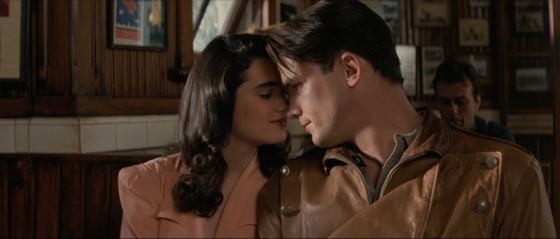
Richard Kirkham is a lifelong movie enthusiast from Southern California. While embracing all genres of film making, he is especially moved to write about and share his memories of movies from his formative years, the glorious 1970s. His personal blog, featuring current film reviews as well as his Summers of the 1970s movie project, can be found at Kirkham A Movie A Day.
Subscribe to:
Posts (Atom)





